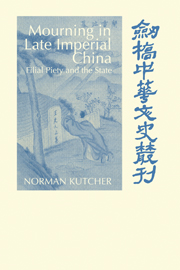Book contents
- Frontmatter
- Contents
- List of illustrations
- Acknowledgments
- A note on conventions
- Reigns of Ming and Qing emperors
- Introduction
- 1 Death and the state in imperial China: continuities
- 2 The reorientation of Ming attitudes toward mourning
- 3 The early Qing transformation of mourning practice
- 4 The bureaucratization of the Confucian li
- 5 The death of Xiaoxian and the crisis of Qianlong rule
- 6 Death and Chinese society
- Select bibliography
- Index
6 - Death and Chinese society
Published online by Cambridge University Press: 14 October 2009
- Frontmatter
- Contents
- List of illustrations
- Acknowledgments
- A note on conventions
- Reigns of Ming and Qing emperors
- Introduction
- 1 Death and the state in imperial China: continuities
- 2 The reorientation of Ming attitudes toward mourning
- 3 The early Qing transformation of mourning practice
- 4 The bureaucratization of the Confucian li
- 5 The death of Xiaoxian and the crisis of Qianlong rule
- 6 Death and Chinese society
- Select bibliography
- Index
Summary
The shifts in policy documented in this book together describe the state's disengagement from mourning and filial piety – a system of practice and belief that had (and has) long been supposed to lie at the core of China's values. And yet, as is also shown here, new rulers did not arbitrarily impose changes to the old values. Instead, the policy of disengagement reflected the changing values of China's elites, those for whom service in the imperial bureaucracy was an ever present if seldom realized opportunity. New attitudes made new policies acceptable.
As shown in Chapter 2, the changes began in the Ming dynasty, with shifting elite attitudes toward the function of ritual. In the late Ming, many elites began to argue that rather than guiding or regulating the emotions in accordance with canonical texts, rituals should instead be performed to express emotions. This development meant that rituals could be changed to make them accord with individualistic and even idiosyncratic beliefs about how the dead should be mourned. In this climate, for example, some came to believe that it was natural and therefore permissible, contrary to the mourning canon, to observe formal mourning for a close friend or deeply respected teacher. Although willingness to change rituals had precedence in Chinese history, late Ming innovations were more extensive than any since the Wei and Jin dynasties, about 1,300 years earlier.
A related late Ming change discussed in Chapter 2 was a new attitude toward duoqing, the cutting short of the mourning period for a parent. Although instances of duoqing were rare in the late Ming, the three cases studied here suggest that many in the state were moving away from a canonically based understanding of how mourning leaves were supposed to operate.
- Type
- Chapter
- Information
- Mourning in Late Imperial ChinaFilial Piety and the State, pp. 190 - 194Publisher: Cambridge University PressPrint publication year: 1999



